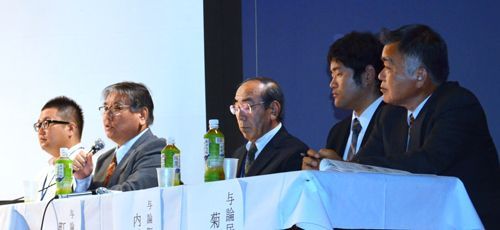Efforts to preserve eight endangered languages discussed at summit in Yoron

Panelists reporting on and discussing efforts to pass down languages: November 13, Yoron Community Gymnasium
November 14, 2016 Ryukyu Shimpo
Naoki Isa Reporting from Yoron, Kagoshima
The 2016 Yoron Endangered Languages and Dialects Summit was held at the Yoron Community Gymnasium in Yoron, Kagoshima on October 13. It was hosted by the Agency for Cultural Affairs, Kagoshima Prefecture, and the town of Yoron. Experts on the eight languages in Japan considered in danger of becoming extinct by the United Nations Education, Scientific, and Cultural Organization (UNESCO) reported on and discussed efforts being taken to preserve and pass down the languages.
In the main address given in the Yoron dialect, Yunnu Futuba, the speaker noted that local vernacular contributes to the diversity of culture, saying, “We should live using both plain Japanese and our dialects.” The eight endangered languages are Ainu, Hachijo, Amami, Kunigami, Okinawan, Miyako, Yaeyama, and Yonaguni. Yunna Futuba is included as part of Kunigami.
Mitsuhiro Machioka, chair of the Yoron Board of Education, showcased the Yunnu Futuba education utilized in places such as integrated studies classes in elementary schools. Hidenori Kiku, head of the Yoron Minzokumura (Yoron Folk Village), commented, “Right now education is focused on elementary school students, and people from around age 45 and over can speak Yunnu Futuba. Educating those middle generations, our young adults, is vital.”
Tomigusuku Board of Education member Koji Shimabukuro reported on the reader created by the BoE and distributed to all the elementary and junior high schools in the city titled, Tomigusuku Island Slang. He noted, “The ideal would be for people to research their own community, and create a community-based dictionary in the interest of preservation.”
Professor Shigehisa Karimata from the University of the Ryukyus suggested, “Education that recognizes language as diverse, and that your words are just as important as the words in other regions, is essential. This can be done by teachers everywhere.”
(Translation by TC&T and Sam Grieb)
Previous Article:East Asia Publishers Conference in Okinawa addresses reviving an East Asian reading community
Next Article:ODB produces document calling citizens’ protests to helipad construction “heinous and illegal”
[Similar Articles]
- Endangered Languages Summit in Okinawa to discuss 8 UNESCO-listed languages
- Symposium on endangered languages held to preserve the Ryukyuan languages
- Ryukyuan Heritage Language Society suggests Okinawa include Ryukyuan languages class in education at schools
- OPG publishes book to help elementary and junior high students learn Shimakutuba
- Kunigami and Yoron Reenact Exchange of Goods to Commemorate 50th Anniversary of Okinawa’s Reversion
 Webcam(Kokusai Street)
Webcam(Kokusai Street)


